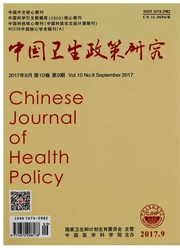

 中文摘要:
中文摘要:
本文采用二项Logistic回归模型,利用2011年"中国健康与养老追踪调查"(CHALRS)数据,对中老年就诊患者选择公立或民营医院的影响因素进行分析。研究发现自评健康、就诊咨询、使用基本医疗保险报销等因素影响显著。健康存量越小、有就诊咨询需求、使用基本医疗保险报销的患者选择公立医院的概率相对较高。说明中老年就诊患者在处理疾病风险时更信赖公立医院,医保定点医院主要集中在公立医院,进一步推动了患者选择公立医院就诊。建议加强对老年性疾病的预防和控制;提高医院的咨询服务水平;加强对民营医院的扶持,放开民营医院的价格限制,调整医保定点医院的准入机制;加强行业监管和信息公开。
 英文摘要:
英文摘要:
This paper uses the binomial logistic regression model and the 2011 China Health and Retirement Longitudinal Study ( CHALRS) to analyze the influencing factors on the choice of public or private hospitals by mid-dle-aged and elderly patients. The study finds that rural residents are significantly influenced by the self-evaluation of health, on-demand clinic consultation, and the use of basic medical insurance systems. There is a higher probability that patients that are not as healthy and that require clinical consultation or the use of the basic medical insurance sys-tem will choose public hospitals. The study concludes that elderly patients have greater trust in public hospitals when they seek treatment for disease risks. Moreover, the fixed points of medical insurance are concentrated in public hos-pitals, thereby prompting patients to choose public hospitals. It is suggested that the prevention and control of senile diseases be strengthened, the level of hospital consulting services be improved, and the access mechanisms of medi-cal insurance fixed point hospitals be adjusted.
 同期刊论文项目
同期刊论文项目
 同项目期刊论文
同项目期刊论文
 期刊信息
期刊信息
